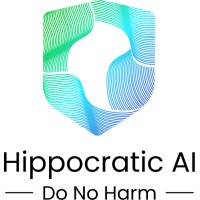Hippocratic AI: Revolutionizing Healthcare with Generative AI
January 10, 2025, 9:31 am

Location: United States, Illinois, Chicago
Employees: 1001-5000
Founded date: 1973
In the bustling world of healthcare, a new player is making waves. Hippocratic AI, a generative AI company, recently secured $141 million in a Series B funding round, catapulting its valuation to a staggering $1.64 billion. This is not just another tech startup; it’s a beacon of hope for a healthcare system in dire need of innovation.
Founded in 2023, Hippocratic AI emerged from the vision of its co-founder, Munjal Shah, and a team of seasoned healthcare professionals and AI researchers. Their mission? To ensure that artificial intelligence in healthcare is safe, effective, and beneficial. The name itself is a nod to the Hippocratic Oath, emphasizing the commitment to “do no harm.”
The latest funding round was led by Kleiner Perkins, a venture capital firm with a storied history of backing giants like Google and Amazon. This endorsement speaks volumes about the potential Hippocratic AI holds. Other notable investors include SV Angel, General Catalyst, and NVIDIA, all of whom see the promise in AI-driven healthcare solutions.
So, what exactly does Hippocratic AI do? At its core, the company focuses on non-diagnostic tasks within healthcare. Think of it as a digital assistant for clinicians. Its generative AI models tackle medication onboarding, policy inquiries, and electronic health record (EHR) assistance. These tasks, while crucial, often consume valuable time that healthcare professionals could spend on direct patient care.
The launch of the Healthcare AI Agent App Store marks a significant milestone. This platform allows clinicians to collaborate with Hippocratic AI in creating specialized AI agents tailored to specific patient needs. Imagine a toolkit where doctors can design their own AI assistants in under 30 minutes. This is not just about efficiency; it’s about empowering healthcare providers to shape the technology that supports them.
Each AI agent undergoes rigorous safety testing, ensuring that it meets the highest standards before deployment. This commitment to safety is a cornerstone of Hippocratic AI’s philosophy. By involving clinicians in the development process, the company taps into their expertise, creating tools that are not only innovative but also grounded in real-world experience.
The implications of this technology are profound. The healthcare industry faces a critical shortage of trained professionals, particularly nurses and social workers. Hippocratic AI aims to bridge this gap. Its AI agents can assist with chronic care management, medication checks, and post-discharge follow-ups. For instance, one agent specializes in managing conditions like kidney failure and congestive heart failure, providing support where human resources are stretched thin.
The company’s approach is collaborative. By working closely with licensed clinicians, Hippocratic AI ensures that its agents are developed with a deep understanding of clinical workflows. This is not a one-size-fits-all solution; it’s a tailored approach that respects the nuances of patient care.
In the past nine months, Hippocratic AI has made significant strides. It has secured its first U.S. patents, validated the safety of its AI agents, and formed partnerships with 23 health systems and payers. These collaborations are crucial, as they provide a testing ground for the technology and help refine its applications in real-world settings.
The potential for growth is immense. With plans to expand into new markets, including pharmaceuticals and international territories like EMEA and Southeast Asia, Hippocratic AI is poised to become a global leader in healthcare AI. The infusion of $141 million will accelerate this expansion, allowing the company to enhance its offerings and reach more healthcare providers.
The Healthcare AI Agent App Store is launching with over 300 AI agents across 25 specialties. This diverse range of tools means that healthcare organizations can find solutions tailored to their specific needs. From pre- and post-surgery care to diabetes education, the applications are vast and varied.
Moreover, the financial model is intriguing. Clinicians who create AI agents can share in the revenue generated from their use. This not only incentivizes innovation but also fosters a sense of ownership among healthcare providers. They are not just users of technology; they are co-creators.
As the healthcare landscape continues to evolve, the integration of AI will be pivotal. Hippocratic AI stands at the forefront of this transformation. By prioritizing safety, collaboration, and innovation, it is setting a new standard for how technology can enhance patient care.
In conclusion, Hippocratic AI is more than just a tech startup; it’s a transformative force in healthcare. With its recent funding and innovative approach, it is well-positioned to tackle some of the most pressing challenges in the industry. As it continues to grow and evolve, the impact of its work will be felt across hospitals and clinics, ultimately improving patient outcomes and reshaping the future of healthcare. The journey has just begun, and the possibilities are limitless.
Founded in 2023, Hippocratic AI emerged from the vision of its co-founder, Munjal Shah, and a team of seasoned healthcare professionals and AI researchers. Their mission? To ensure that artificial intelligence in healthcare is safe, effective, and beneficial. The name itself is a nod to the Hippocratic Oath, emphasizing the commitment to “do no harm.”
The latest funding round was led by Kleiner Perkins, a venture capital firm with a storied history of backing giants like Google and Amazon. This endorsement speaks volumes about the potential Hippocratic AI holds. Other notable investors include SV Angel, General Catalyst, and NVIDIA, all of whom see the promise in AI-driven healthcare solutions.
So, what exactly does Hippocratic AI do? At its core, the company focuses on non-diagnostic tasks within healthcare. Think of it as a digital assistant for clinicians. Its generative AI models tackle medication onboarding, policy inquiries, and electronic health record (EHR) assistance. These tasks, while crucial, often consume valuable time that healthcare professionals could spend on direct patient care.
The launch of the Healthcare AI Agent App Store marks a significant milestone. This platform allows clinicians to collaborate with Hippocratic AI in creating specialized AI agents tailored to specific patient needs. Imagine a toolkit where doctors can design their own AI assistants in under 30 minutes. This is not just about efficiency; it’s about empowering healthcare providers to shape the technology that supports them.
Each AI agent undergoes rigorous safety testing, ensuring that it meets the highest standards before deployment. This commitment to safety is a cornerstone of Hippocratic AI’s philosophy. By involving clinicians in the development process, the company taps into their expertise, creating tools that are not only innovative but also grounded in real-world experience.
The implications of this technology are profound. The healthcare industry faces a critical shortage of trained professionals, particularly nurses and social workers. Hippocratic AI aims to bridge this gap. Its AI agents can assist with chronic care management, medication checks, and post-discharge follow-ups. For instance, one agent specializes in managing conditions like kidney failure and congestive heart failure, providing support where human resources are stretched thin.
The company’s approach is collaborative. By working closely with licensed clinicians, Hippocratic AI ensures that its agents are developed with a deep understanding of clinical workflows. This is not a one-size-fits-all solution; it’s a tailored approach that respects the nuances of patient care.
In the past nine months, Hippocratic AI has made significant strides. It has secured its first U.S. patents, validated the safety of its AI agents, and formed partnerships with 23 health systems and payers. These collaborations are crucial, as they provide a testing ground for the technology and help refine its applications in real-world settings.
The potential for growth is immense. With plans to expand into new markets, including pharmaceuticals and international territories like EMEA and Southeast Asia, Hippocratic AI is poised to become a global leader in healthcare AI. The infusion of $141 million will accelerate this expansion, allowing the company to enhance its offerings and reach more healthcare providers.
The Healthcare AI Agent App Store is launching with over 300 AI agents across 25 specialties. This diverse range of tools means that healthcare organizations can find solutions tailored to their specific needs. From pre- and post-surgery care to diabetes education, the applications are vast and varied.
Moreover, the financial model is intriguing. Clinicians who create AI agents can share in the revenue generated from their use. This not only incentivizes innovation but also fosters a sense of ownership among healthcare providers. They are not just users of technology; they are co-creators.
As the healthcare landscape continues to evolve, the integration of AI will be pivotal. Hippocratic AI stands at the forefront of this transformation. By prioritizing safety, collaboration, and innovation, it is setting a new standard for how technology can enhance patient care.
In conclusion, Hippocratic AI is more than just a tech startup; it’s a transformative force in healthcare. With its recent funding and innovative approach, it is well-positioned to tackle some of the most pressing challenges in the industry. As it continues to grow and evolve, the impact of its work will be felt across hospitals and clinics, ultimately improving patient outcomes and reshaping the future of healthcare. The journey has just begun, and the possibilities are limitless.


